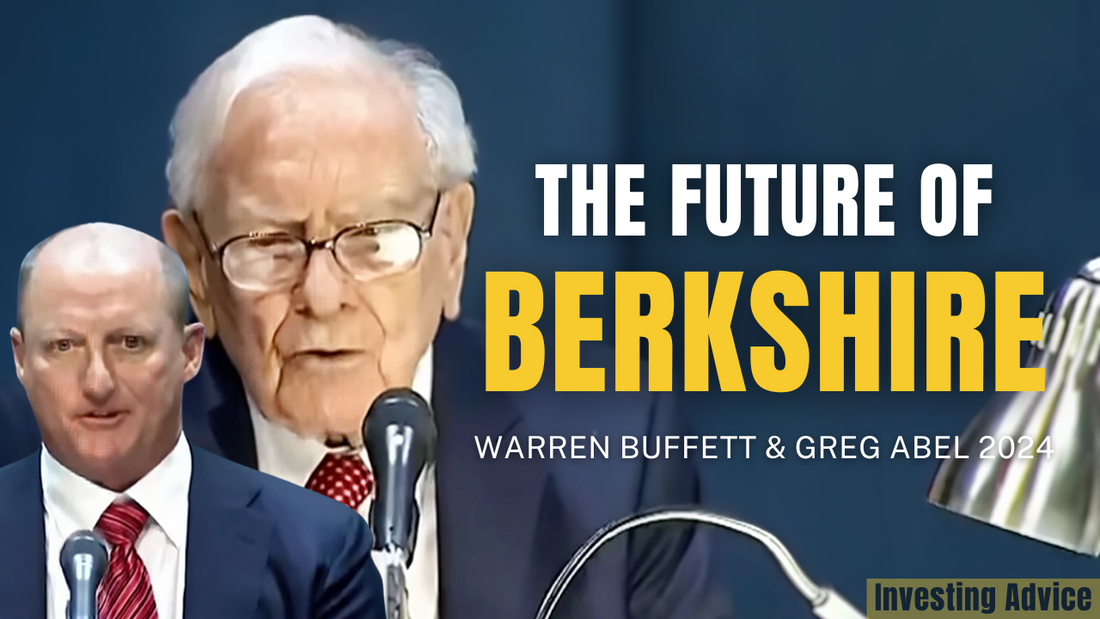
Who Will Handle Warren Buffett’s Portfolio After He’s Gone? | Berkshire 2024
[Transcript]
BECKY QUICK: Alright, the next question comes from Slavin Vucelbrot (PH). As CEO, will Mr. Abel be in charge of the portfolio of common stocks that Mr. Buffett has been managing, or will this function be exercised by Mr. Combs and Mr. Weschler? As investing could be defined as the discipline of relative selection, can major capital allocation decisions, such as large acquisitions, be separated from the common stock selection process?
WARREN BUFFETT: Yeah, I would say that decision actually will be made when I’m not around, and I may try and come back and haunt them if they do it differently. (Laughs) But I’m not sure the Ouija board will get that job done. So that job, I’ll never know the answer on whether it gets covered, but I feel very comfortable about the fact that it will be made by a board, that they’ve got loads of brainpower, they’ve got a dedication to an unusual institution, and they will figure things out.
But I would say that if I were on that board and we're making the decision, I would probably, knowing Greg, I would just leave — I would leave the capital allocation to Greg. And he understands businesses extremely well. And if you understand businesses, you understand common stocks. I mean, if you really know how business works, you are an investment manager. How much you manage, maybe just your own funds or maybe other people. And if you really are primarily interested in getting assets under management, which is where the money is, you know, you don’t really have to understand that sort of thing. But that’s not the case with Ted or Todd, obviously.
But I think the responsibility ought to be entirely with Greg. The responsibility has been with me, and I farmed out some of it. And I used to think differently about how that would be handled, but I think the responsibility should be that of the CEO. And whatever that CEO decides may be helpful in effectuating that responsibility. You know, that’s up to him or her to decide at the time they're running the money.
So I would say that my thinking on that has developed to some extent as the sums have grown so large at Berkshire, and we do not want to try and have, you know, 200 people around that are managing a billion each, it just doesn’t work. And I think that when you’re handling the sums that we will have, you’ve got to think very strategically about how to do very big things, and I think Greg is capable of doing that.
I think I’ve missed a lot of stuff in the past, so I’m actually wiser about doing that now. But I, you know, I would do it better this time around than 2008 and ‘9, if something akin to that happened. But it won’t be exactly like 2008 or ‘9, you can be sure of that. But you also can say that there will be times when having huge sums available extremely quickly. Maybe it will be once every five years, probably more like once every ten years or something.
But as the world gets more sophisticated, complicated, and intertwined, more can go wrong. And there’s no sense going through here exploring the possibilities of the different things that could happen. But you do want to be able to act when it happens. And I think the chief executive should be somebody that can weigh buying businesses, buying stocks, doing all kinds of things that might come up at a time when nobody else is willing to move.
It wasn’t that people didn’t have money in 2008. It’s that they were paralyzed. And we did have the advantage of having some capital and a willingness and eagerness, even, to act, and a government that, in effect, looked at us as an asset instead of a liability. And I think that all of those qualities will be even more important as our capital pile grows. So I think Greg may have even more fun than I had in a period when extraordinary things were happening and we were the logical place to go.
You never know whether it’ll be next week, next year, next decade, but it won’t be, you know, it won’t be a century from now, that is for sure. And the more intertwined and sophisticated the world financial situation gets the more vulnerable it gets in a certain sense. It solves a lot of small problems, but it leaves it more vulnerable to large problems. Greg, does that bother you at all or not? (Laughter)
GREG ABEL: Without directly answering the question, I think there’s one important thing is I think as we go through any transition, it’s important to know that the capital allocation principles that Berkshire lives by today will continue to survive, Warren. And I think that’s the thing I’d want to communicate, that we have our operating businesses, insurance, non-insurance, we’re going to cap that.
We’ll provide them the capital necessary to be successful and grow, if it’s appropriate. At the same time, we’re expecting return of capital from them when they have excess cash. And then, as we’ve discussed, or you’ve touched on always looking at potentially new businesses as a whole or in a piece, and as you’ve always highlighted, and I fully agree, it’s, we’ll always look at equities as we’re investing in a business, either 1% or 100%, but we’re looking at the business, we’re looking at the economic prospects of that business, how sustainable it is, and what it will look like ten years from now.
And is our, the capital we originally put in at exponential risk, or where’s that risk set, that profile. And then, of course, and then we’ll obviously continue to always put excess cash in the safest investment there is in US Treasuries, knowing we want to maintain that fortress of a balance sheet for two reasons. One, to act, but also to always protect our shareholders. We want to maintain the position Berkshire is in now, realistically for the — to ensure it, to ensure it endures.
WARREN BUFFETT: Well, when he says that, it makes me wish I’d stayed around to be number two instead of number one in this process over the years. It’s, you know, it doesn’t get more fun than what we’re doing, and we’re better positioned than ever before.
We’re not positioned though, however, to earn extraordinary returns versus what American business generally earns. I would hope we could be slightly better, but nobody’s going to be dramatically better in some — you know, over the next century, it gets very hard, it gets very hard to predict who the winner will be.
If you look back, as we did a few meetings ago, as the top 20 companies in the world at ten-year intervals, you realize the game isn’t quite as easy as it looks. But getting a decent result actually is reasonably, should be reasonably easy if you just don’t get talked out of doing what that has worked in the past, and don’t get carried away with fads, and don’t listen to people who have different interests in mind than the interests of our shareholders.
Source: https://buffett.cnbc.com/2024-berkshire-hathaway-annual-meeting/
[YAPSS Takeaway]
Financial crises aren’t about the lack of money but the paralysis of decision-making. Keep a clear head and act when others hesitate.
